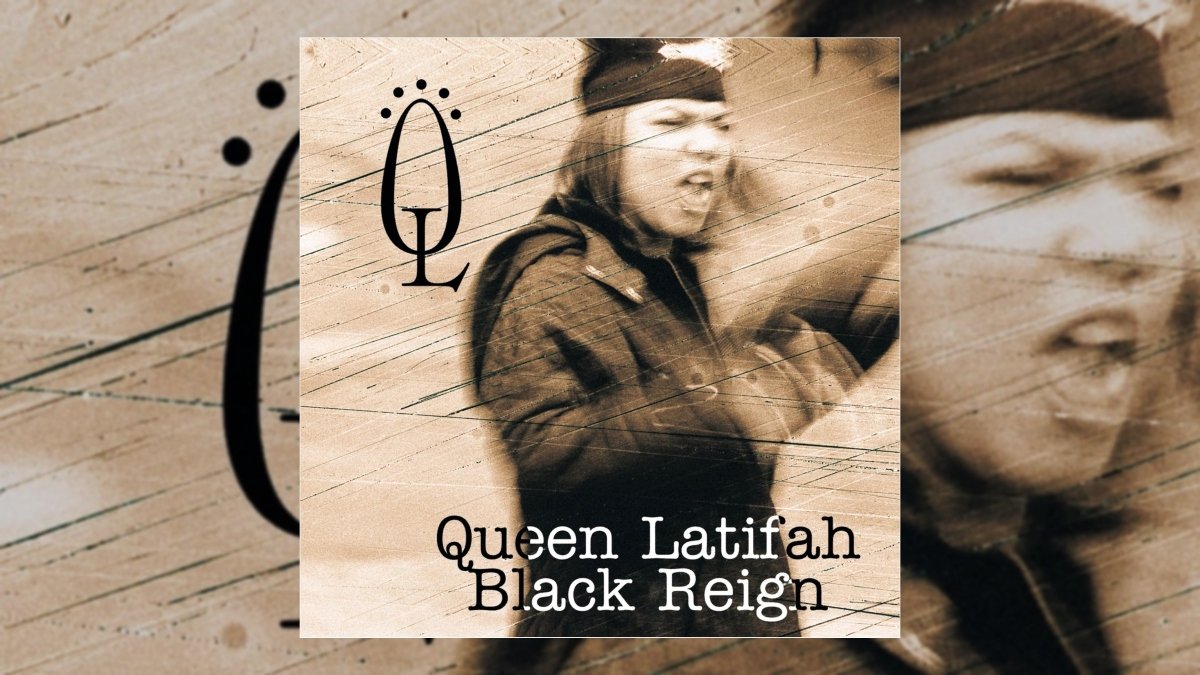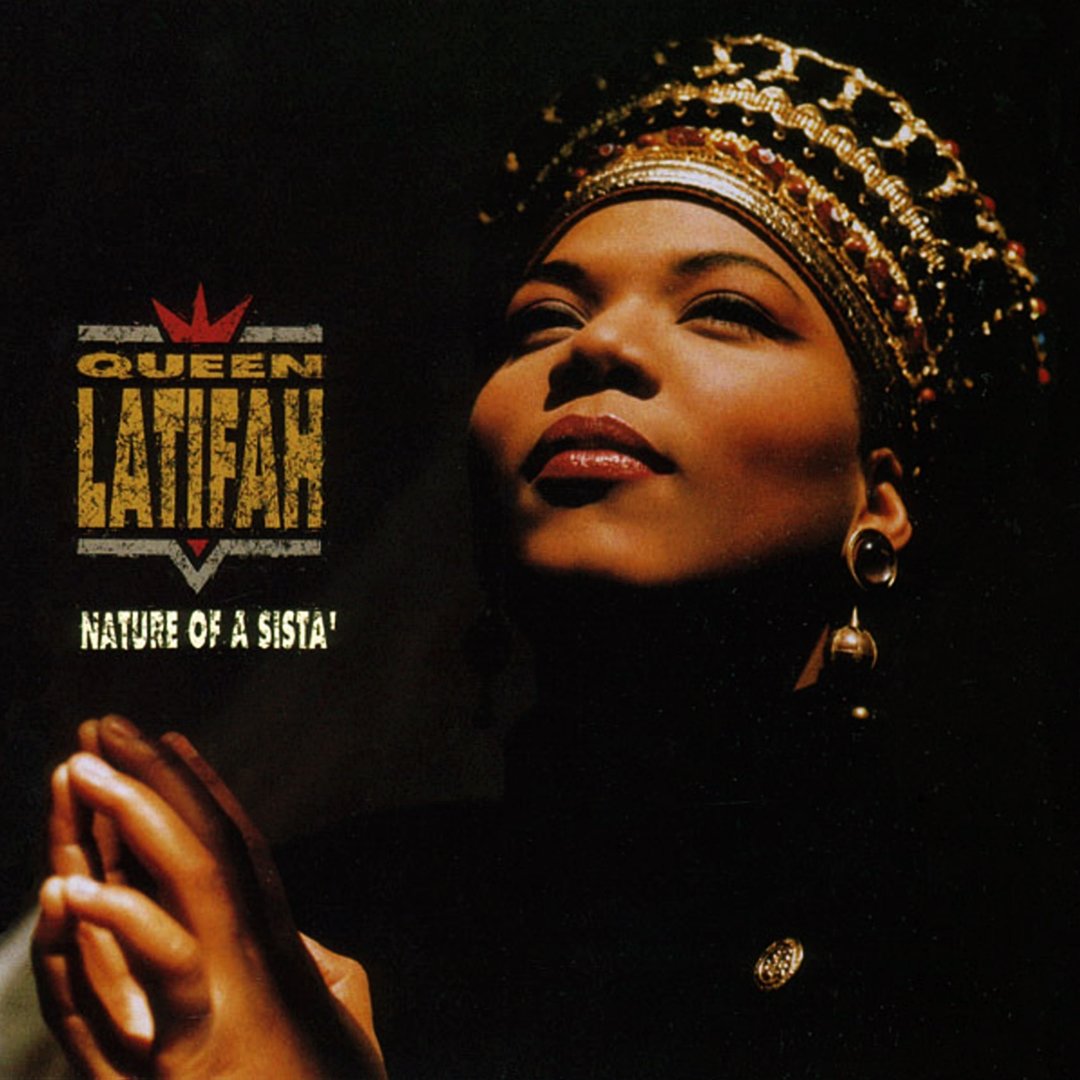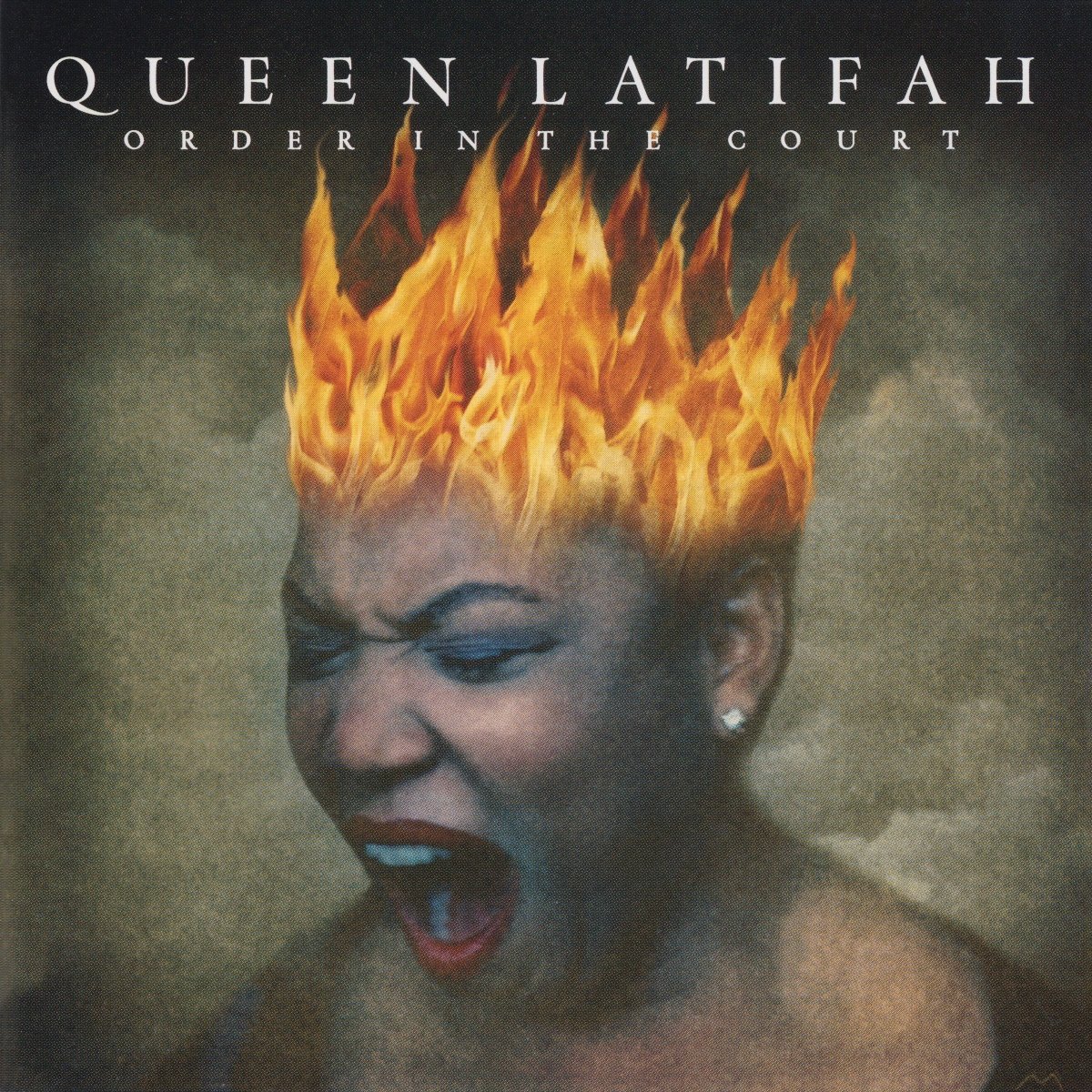Happy 30th Anniversary to Queen Latifah’s third studio album Black Reign, originally released November 16, 1993.
“One stupid turn on a motorcycle and, wham, it’s all over. I don’t think I’ll ever really understand why it happened or why it had to be him.” Queen Latifah condensed a massive sadness into a few sentences for Essence Magazine in 1993. The key she began wearing on a necklace was from the motorcycle that killed her brother in 1992—a bike she gifted him only a couple months prior because riding was something they enjoyed together. It was during this dark period that she began crafting her most potent and personal album to date, Black Reign.
Her exceptional skills as a rapper first commanded attention on her debut All Hail the Queen (1989) featuring the Black feminist jam turned hip-hop classic “Ladies First.” Her next record, Nature of a Sista’ (1991) leaned into a poppier fusion of hip-hop and R&B that was progressive, but didn’t pay off commercially as expected. In response to its soft sales, Tommy Boy Records cut ties with the Jersey-born artist. Fortuitously, Motown Records executive Jheryl Busby had been cheering Latifah on from the sidelines and jumped at the chance to strike a deal with her.
Latifah was quickly becoming the people’s champion with her grip on music, television (as star of Fox’s Living Single series), and film. Rapid developments in Black culture (music or otherwise) were already necessitating a shift, but the death of her brother broke something in her. While her chosen name Latifah means “delicate, gentle, or sensitive” in Arabic, it was the infighting within hip-hop at large that made her raise her voice—indelicately as necessary. “And if I have to curse at you to get my point across, it’s what I gotta do,” she punctuates at one key moment. Black Reign documents the arc of tragedy forcing a protagonist to go dark in service of a higher goal.
Since her activity with the Native Tongues collective had cooled by 1993, it was a good time to break with her previous Daisy Age sound. In its place, Latifah embraced the streets like never before. Much of Black Reign was produced by Tony Dofat (Mary J. Blige, Heavy D & The Boyz), relative newcomer Sidney “S.I.D.” Reynolds (Nikki D), and former collaborator Keir “Kay Gee” Gist of Naughty By Nature.
Grimy ‘90s east coast hip-hop takes the wheel. All of the tracks bounce and swing here; there aren’t even any hip-house diversions like “Come to My House” or “Bad as a Mutha.” No, Black Reign focuses on gritty loops, filtered basslines to wreck your woofer, and for her highness, the songstress, more than a few melodic hooks. Never has she been more accessible and in-demand than on Black Reign, a skipless wonder in her canon.
Watch the Official Videos:
It’s hard to understate how such loss shapes any person, let alone an artist. But for this artist, the gloves came off. The primary target under the queen’s attack was sexism. Responding to unchecked misogynoir in Snoop Dogg’s Doggystyle (1993) and other big-selling offenders, she aimed the righteous rabble rousing of “U.N.I.T.Y.” and fired. Armed with beefy bass and a smooth Crusaders sample (“Message from the Inner City”), it typified the best hip-hop offerings of 1993.
With that authoritative voice, she thunders, “Who you callin’ a bitch?!” Many radio and video outlets elected not to censor the word in service of addressing rampant usage of the B-word. “U.N.I.T.Y.” folded open discussion of verbal and physical abuse against women into a single that would ultimately become Latifah’s biggest solo song, reaching peaks of #23 in Pop, #7 R&B, and #2 Rap–fairly unprecedented for female emcees, who were still fighting to be regarded as equal to their male counterparts.
Taking off her regal headpiece for second single “Just Another Day” proves a winning move here (“Latifah’s on vacation / I’m just plain ol’ Dana today”). She sheds her rap star status to paint a bleak but beloved portrait of her hood to the tune of Herb Alpert’s “Makin’ Love in the Rain.” The topically sober Black Reign was didactic enough without totally stopping the party. Motown wisely put up one of its strongest tracks for a third serve. Like a fist clasp turned to a familial embrace, “Black Hand Side” is rugged outside, but warm within. Coasting on a filtered down bassline from The Isley Brothers’ “Hello It’s Me,” it opens the record and sets the tone for how to have a good get-down in hard times.
Even if she weren’t slinging witty couplets and disses, Latifah’s voice alone can make you straighten up your back. It shows up best on tracks like the cited “Black Hand Side” or “Bring the Flavor” where her cadence is unassailable. Even on quick-and-dirty freestyles like “No Work” and “Just a Flow,” she’s at her best. It’s moments like these when she doesn’t have to grab someone by the front of their shirt that counteract the discipline she metes out elsewhere.
On Nature of a Sista’, Latifah declared, “I do not cuss because my mommy said to watch my mouth!” But then the game tried to manhandle her, so she had to get “Rough” with ‘em. Treach, KRS-One, and Heavy D (who takes a PG stance here as on 1991’s “Don’t Curse”) go bar-for-bar with Latifah on this hardcore exposition. Although her next collection would be her first to bear a Parental Advisory label, it’s a formality. Black Reign deserved one for “Rough” alone (“This ain't your lucky day / So go pray, now you pay, 'cause I don't fuckin' play”).
For her rap skills, Latifah was on par with the best of any man. But long before Michelle Obama was encouraging us to “go high,” Latifah had to let one lady know she was capable of going low. We may not know what got into Roxanne Shante on 1991’s “Big Mama,” but that track jumped into the crowd, windmill punching any female emcee within arm’s length including Yo-Yo, Salt-N-Pepa, MC Lyte, Monie Love, and specifically Latifah. In a slight to “Ladies First,” Shante claimed that she is the real “first lady” since her 1985 debut on “Roxanne’s Revenge” at 14-years-old. Latifah counters that Shante hasn’t made any impact since she was 14. She took an entire verse of “I Can’t Understand” to address this unpleasantness (“The moral of the verse is your career is through / And don't be fuckin' with nobody / Who ain't fuckin' with you... / Next time there might not be no talkin’!”).
Enjoying this article? Click/tap on the album covers to explore more about Queen Latifah:
As much as Latifah could talk tough, she counterbalanced it with the love and sex she hinted at on Nature’s “How Do I Love Thee.” “Superstar” gives free game on how to step to a woman with confidence, by explaining how men get it wrong. The tropical R&B of fourth single “Weekend Love” lets her croon a sweet love song that, with dancehall toasting from Tony Rebel, doesn’t feel out of place among the heavier hip-hop textures surrounding it. The midtempo, body-rolling “Mood Is Right” emphasizes Latifah’s feminine side and sexual readiness.
Any proper discussion of sex in the 1990s, meant grappling with the reality of the AIDS epidemic that was still raging, particularly in the Black community. As Salt-N-Pepa did with “Let’s Talk About Sex,” Latifah takes pains to highlight safe sex on “Coochie Bang.” She issues some of her smartest bars to encourage everybody to protect the lovin’ at all times. Referencing an upcycled snippet of Naughty By Nature’s “It’s On,” she advocates, “Forget your promises and use your condom sense / Or I'm a glimpse then I'm gone / So long / The only thing that's ‘on’ is your clothes / Now go home.”
“Black Reign is about the past year of my life,” Latifah explained to Essence. “The hardest year I’ve ever lived through. I still can’t believe that my brother, my brother is really gone.” The centerpiece of the album is its closer “Winki’s Theme,” titled after the childhood nickname of her late sibling. Latifah blossoms on this heartfelt blend of spirit, jazz, and hip-hop which she produced alone. Laying herself as bare and vulnerable as ever, this piece introduces her scat singing, rhyme-flipping true self as would continue to inform her music in later years.
Like her predecessors, Latifah kicked the door open even wider for women in rap. As if synchronizing their cultural movements, MC Lyte and Yo-Yo also adopted notably harder stances earlier in 1993 on Ain’t No Other and You Better Ask Somebody as female hip-hop acts proving their mettle in a male-dominated music industry. As with Nature of a Sista’, they too were met with mixed reactions to employing glossier pop/R&B vibes before shifting into harder edged material. Arguably, Black Reign was the most successful volley of these three projects.
Black Reign reached #60 Pop, #15 R&B. Among the lady’s firsts, Black Reign became the first gold certified album from a female rapper. “U.N.I.T.Y.” also won Best Rap Solo Performance from the Recording Academy, but at the time of the ceremony, they weren’t even televising the category yet. “When I actually won the GRAMMY, it kind of made me smile, but only for a second,” she reveals in her motivational book Put on Your Crown (2010). “There was too much sadness for me to be in the moment and really enjoy it.”
Even as Khadijah in the aforementioned sitcom Living Single, Latifah still wore Lancelot’s fateful key around her neck. After the successful five-year run of the show, she had only begun to wrestle with depression and guilt that fueled a spiral into drug and alcohol abuse, the effects of which began to show on Order in the Court (1998).
Today she is primarily known as an acting, philanthropy, and business magnate with new fans having to “discover” that Queen Latifah started out a rapper—and a nonpareil one at that. Though it would be a long time before therapy allowed her to forgive herself and move forward, she would still become the first hip-hop artist to get a star on the Hollywood Walk of Fame in 2006. She doesn’t wear Lance’s key as often as in 1993. The blackness fades, but the reign remains.
Listen:



